10 December 1845 inspiration for Panjaabi Farmers Rebellion in India
We are witness to history repeating itself in Delhi. The monumental gathering of Panjaab on the doors of Delhi (Dheli says the author) epitomises the great Khalsa Army’s decision on 10 December 1845 (start of Anglo-Sikh War) to launch the offensive against the ever more encroaching British India power, keen to consume the last remaining dominion of independence into its expansive empire, says British activist-writer Jagdeesh Singh. This Panjaabi National Morcha, the expanding rebellion by the Panjaabi farmers, exemplifies the historically enduring Panjaabi spirit of resistance, courage and defiance.
![We are witness to history repeating itself in Delhi. The monumental gathering of Panjaab on the doors of Delhi (Dheli says the author) epitomises the great Khalsa Army’s decision on 10 December 1845 (start of Anglo-Sikh War) to launch the offensive against the ever more encroaching British India power, keen to consume the last remaining dominion of independence into its expansive empire, says British activist-writer Jagdeesh Singh. This Panjaabi National Morcha, the expanding rebellion by the Panjaabi farmers, exemplifies the […]](https://www.theworldsikhnews.com/wp-content/uploads/2020/12/Punjabi-farmers-360x266.jpg)
ON 10 DECEMBER 1845, ON THAT HISTORIC DAY 175 YEARS EARLIER, the glorious braves of the sovereign, independent Panjaab nation, which had fought and achieved its free country and governance, took the brave decision to stop the devious British Indian intrusion in its tracks.
The ongoing expanding rebellion by the Panjaabi farmers exemplifies the historically enduring Panjaabi spirit of resistance, courage and defiance against overpowering governments and states and a readiness to enter into a fearless head-on dissent and battle. This individual and collective defining, indigenous characteristic of the Panjaabi, substantially enhanced and fine-tuned by the Ten Gurus into the model of a ‘saint-soldier’; has made its sawa-lakh presence felt throughout history to the current times.
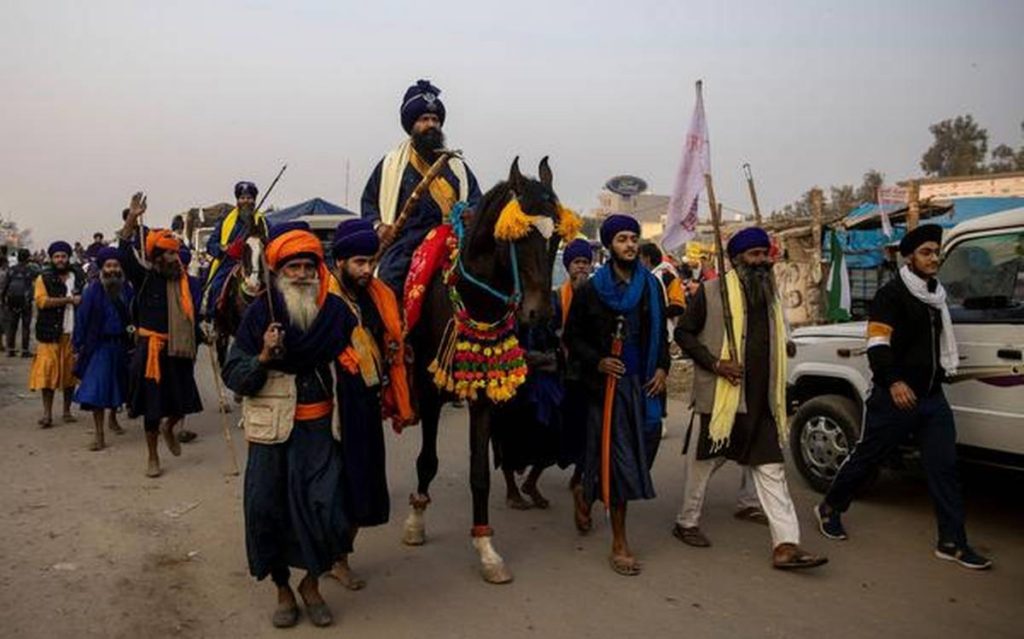
The shaheeds -martyrs, from Banda Singh Bahadur to Baba Deep Singh to Bhai Garja Singh and Bota Singh to the current Bhai Jarnail Singh Bhindranwale and Jaswant Singh Kalra; represent an endless stream of the power within the Panjaabi-Sikh character and nation.
The Ten Gurus taught and inspired us to be an ethical, free and empowered people, neither subordinate nor subjugated.
Raaj Karega Khaalsa! Degh o Tegh o Fateh!
Demonstrably, the indigenous Panjaabi DNA, infused and enhanced by Sikh idealism, has made the former into a phenomenal force for good and justice. Panjaabi and Sikhi are an interwoven indigenous force to be reckoned with.
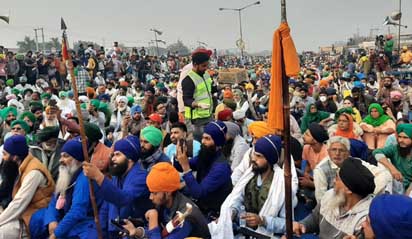
The current Panjaabi farmers protests against the superimposing, draconian laws issued by the Indian centralist government, to create an all-India wide open arena for corporate intrusion and invasion into the already massively unsupported and hugely vulnerable indigenous farming sector: is, again, the rise of the Panjaabi-Sikh spirit to the forefront. Demonstrably, others have joined in the back of this.
The vivid images of the Panjaabis women, Nihangs, Sardaars and farmers marching forward to the Dheli capital of the rogue Indian state, breaking through multiple Indian police and paramilitary-style barricades and systematically dug holes on the road plus high-intensity water being projected as a weapon on the farmers coupled with the usual hands-on police lathi violence. This is all, a stunning demonstration to the world of the democratic power and spirit of the Panjaabi nation. Even more so, the entire Panjaabi nation, as before, have galvanised together both in Panjaab, across India and abroad: in solidarity with our champions of the soil, the food-producing back-bone of our indigenous economy and deeply connected practitioners of Panjaab’s indigenous farming wonders!
The current morcha is more than just a ‘farmers’ matter. It is about the quality of farming and farming income in Panjaab, and much more! It is about the soul of Panjaab.
The four-month-long mammoth agitation, originating in Panjaab, and now gathering support from other regions: has now proven to the world its commitment to take the struggle to the door-step of Indian power. This is a modern-day David versus Goliath. People against the Government.
The 200,000 or so gathered and united in Dheli, with their indigenous Guru Ka Langar, their evocative Sikh slogans, their wondrous Shaheed memories (past and present), their passion, their readiness to stand and keenness to die: to bear the brunt of India’s ongoing savage response and saint-soldiers.
This monumental gathering of Panjaab on the doors of Dheli, epitomises the great Khaalsa Army’s decision on 10th December 1845 to launch the offensive against the ever more encroaching British India power, keen to consume the last remaining dominion of independence into its expansive empire.
On that historic day 175 years earlier (start of First Ango-Panjaab War) , the glorious braves of the sovereign, independent Panjaab nation, which had fought and achieved its free country and governance; took the brave decision to stop the devious British Indian intrusion in its tracks. The Khalsa Army crossed the artificial restrictive boundary imposed by the British of the Sutlej river and entered into the Panjaabi territories in southern Panjaab, where the British were stationed and ready to launch a military onslaught on the northern Panjaabi state.
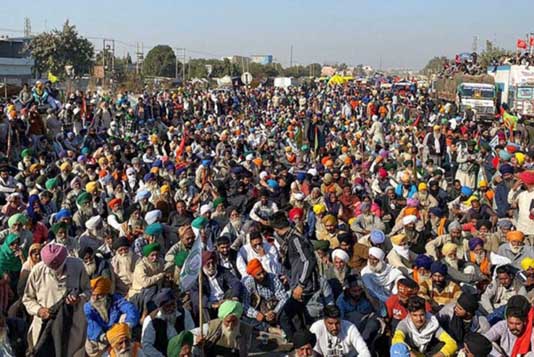
This courageous act was to trigger the famous First Anglo-Panjaab War, which ran from 1845-1846, It tragically resulted in the military and political defeat of the Panjaabi nation; not least with the active connivance of the notorious Dogras, Patialas and other treacherous segments (the earlier equivalents of the Badals and many more) of that time who aligned themselves with the British ambitions and plans to take over and consume Panjaab into the British India giant.
Like other treacherous figures across the map of South Asia, the Dogras and Patialas provided the required lubrication to enable and facilitate British plans to be implemented and secured, even when military success was not certain and even in moments of an actual military defeat by this most formidable opposition that the British had ever encountered. Espionage, treachery, connivance is a wonderful tool in the destruction of nations and states. One which the British strategists used with immense adeptness to secure British India, fighting off fellow European contenders like the French, Dutch and Portuguese.
The current morcha is more than just a ‘farmers’ matter. It is about the quality of farming and farming income in Panjaab, and much more! It is about the soul of Panjaab. Justice, freedom and independence from the savage policies of the oversized Indian state, since 1947, which has been both exploiting Panjaab and depleting and diminishing Panjaab on every kind of level. Panjaab certainly does not deserve any more Indian injustice!
The power, punch and passion of the rebellion of a stateless and subjugated people, and their collective will to take on a state which is multiply more powerful on so many levels: perfectly epitomises the enduring psychology of the Panjaabi people never to accept defeat or suppression. To fight back and try again, even when militarily and politically emasculated. To change and break out of the circumstances.
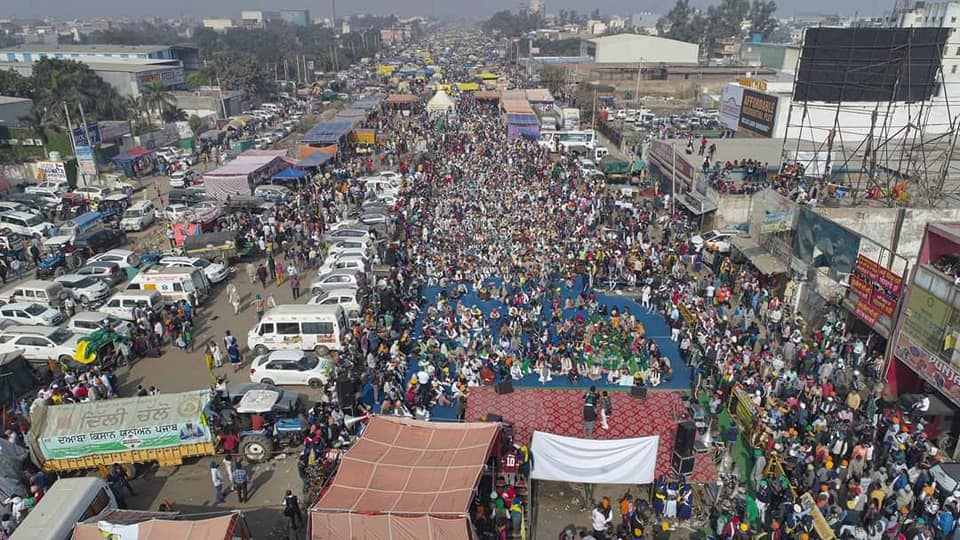
This rounded and robust spirit of a people, who have seen so much agony, genocide, upheavals, partitions, mammoth displacements and political conniving and manoeuvring over them by others; remains ready to reach out for that stolen freedom and independence. To be able to stand and walk on our two feet. To be able to govern and decide our own development, in our own way. To sell our indigenous produce around the world markets, as far as the United Kingdom and Canada and Europe. To build our economy, educational institutions and public infrastructure to a world-class level. To have our sports teams perform in the Olympics. To have our people enjoy a dignified and financially secure life, which they so positively deserve through their laborious hard-work and sweat and blood. To have a high-quality army, ready and equipped to counter and decisively defeat any military attack.
The result of the present uprising is definitely likely to be different than that of the Anglo-Sikh war. Today’s conflict between the Panjaabi farmers and the Indian state epitomises all the factors of the above war of independence for Panjaab.
May the current morcha take us Panjaabis forward to new heights and levels on the enduring journey to unshackle ourselves from the doldrums of the Indian subjugation, and rise as a free, independent nation in the world.
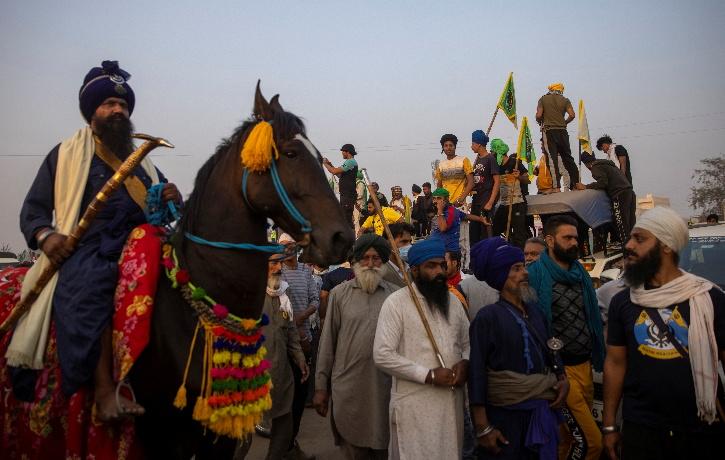
Those great soldiers who crossed the Sutlej on 10th December 1845, did so with the death-defying mission to bolster and protect the cherished country and independence that history, experience, struggle, nature and Waheguru had given to deserving and worthy people.
175 years on, let us remain invigorated and focussed on restoring that lost country, and re-achieving that dignity and great quality of life which we had before as a free, independent, sovereign people.
The feelings and sentiments of the above are manifest and vocal in the current full-scale Panjaabi national morcha! Raaj Karega Khaalsa! Degh o Tegh o Fateh!
